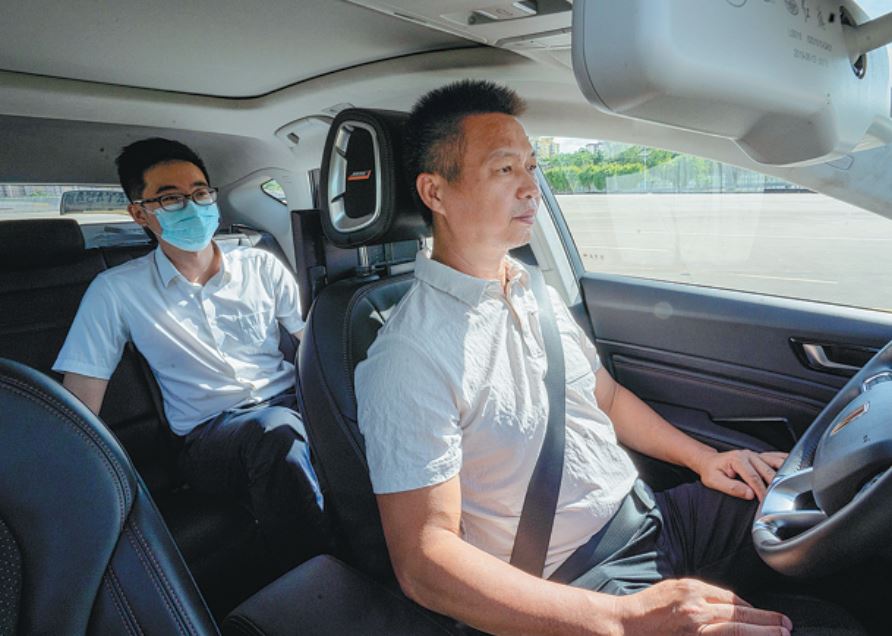Autonomous tech in top gear as firms bullish on potential


SAIC, Xiaomi among industry players upping investment
Automotive manufacturers are driving the development of smart vehicles with autonomous capacities in their growing conviction that the technology can deliver safer and cheaper mobility.
China's largest carmaker, SAIC Motor, established a smart truck subsidiary on Thursday. The Shanghai-based subsidiary said it will release heavy-duty trucks capable of Level 3 functions later this year.
According to the Society of Automotive Engineers International, autonomous driving has six levels: from Level 0, which means no automation, to Level 5, or full automation. Level 3 functions can enable drivers to take their hands off the steering wheel and eyes off the road.
SAIC said its trucks will be used in such places as ports and plants, where traffic conditions will be easier. It said the Level 3 trucks will pave the way for Level 4 functions.
Startups including Pony.ai and TuSimple are exploring autonomous driving solutions for heavy trucks as well.
Li Hengyu, head of Pony.ai's truck division, said there is huge potential for autonomous driving in the logistics sector. He estimated that the technology can cut the costs of a truck fleet by 40 percent, as there will be little need for human drivers.
Statistics show that China's road freight totaled 33.8 billion metric tons in 2020, with more than 30 million truck drivers on the roads each day.
Robotaxis are hitting China's roads as well. SAIC will launch 40-60 Level 4 vehicles for tests in Shanghai and Suzhou in Jiangsu province by the end of this year, said Vice-President Zu Sijie. He was speaking at the World Artificial Intelligence Conference in June.
Baidu is moving even faster in this respect. It was approved in May to charge passengers for driverless robotaxi services in Beijing's Shougang Park, which the technology company said marked another step toward commercialization.
The company aims to build a robotaxi fleet of 3,000 vehicles in two years, with total users expected to reach 3 million across 30 Chinese cities by 2023.
Baidu said it has offered more than 4 million rides over the past few years in four cities: Beijing; Guangzhou in Guangdong province; Cangzhou in Hebei province; and Changsha in Hunan province.
Earlier this month, Baidu released a Level 5 concept vehicle. CEO Robin Li said cars of the future will be fully autonomous with self-learning and continuous self-improvement abilities.
In March, Chinese smartphone maker Xiaomi announced plans to launch an electric vehicle business and invest $10 billion over the next 10 years.
Last week, it acquired an autonomous driving startup. The acquisition of Deepmotion for around $77.37 million will "enhance the technological competitiveness" of its electric vehicle business, Xiaomi said in a statement on Wednesday.
The acquisition could help bring some form of automation to Xiaomi cars, a feature being developed by many automakers for electric vehicles.
Xiaomi will compete with companies like Baidu and even Huawei, as well as carmakers including Tesla, Xpeng and Nio. All of them are developing driver-assist and autonomous driving solutions.
Nio expects its autonomous driving staff members to number around 800 by the end of this year from 500 in August, said Chairman and CEO William Li.
A Nio driver died in a crash earlier this month while the vehicle's driving-assist system was on.
Dong Yang, vice-president of leading automotive think tank China EV 100, said carmakers should be more careful regarding high-level smart driving technologies.
"They must be objective. More importantly, they need to educate users about the new technology."
While convinced that the technology will offer easier and safer driving in the long run, analysts are calling for legislation to regulate the sector and assist its healthy development as such vehicles' popularity is growing rapidly in China.
Statistics from the Ministry of Industry and Information Technology showed that 15 percent of vehicles sold last year in China had Level 2 functions.
That figure rose to 17.8 percent in the first quarter of the year, and it was higher in the segment of new energy vehicles, at more than 30 percent.
China expects vehicles with Level 2 functions to account for around half of all vehicles sold in 2025.




































